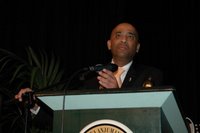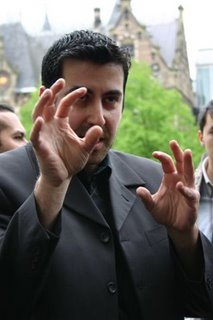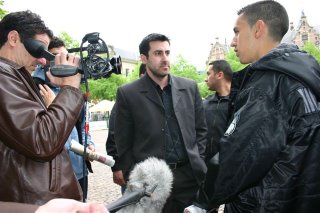 'Parking for Maronites only'
'Parking for Maronites only'
By Anthony Shadid,
Washington Post Foreign Service,
Tuesday, November 28, 2006
BEIRUT, Nov. 27 -- The evening was tense, as most are these days in Beirut, its Maronite Catholics, Greek Orthodox, Sunni and Shiite Muslims and Druze perched imprecisely between war and peace. Malak Beydoun, a young woman, pulled her car into a parking lot in the Christian neighborhood of Ashrafiyeh. She peered at a billboard overhead, alarmed and then indignant.
"Parking for Maronites only," it read.Beydoun recoiled. "How did they know that I was a Shiite?" she remembered asking herself.
Part provocation, part appeal -- with a dose of farce that doesn't feel all that farcical -- advertisements went up this month on 300 billboards across the Lebanese capital and appeared in virtually every newspaper in the country.
Thousands of e-mails carried the ads across the Internet to expatriates. Each offered its take on what one of the campaign's creative directors called a country on the verge of "absurdistan" -- cooking lessons by Greek Orthodox, building for sale to Druze, hairstyling by an Armenian Catholic, a fashion agency looking for "a beautiful Shiite face." At the bottom, the ads read in English, "Stop sectarianism before it stops us," or, more bluntly in Arabic, "Citizenship is not sectarianism."
The campaign, designed for free by an ad agency and promoted by a civil society group, has forced Lebanon to look at itself at a time when the country is spiraling into one of its worst political crises in years. The timing was coincidental, the message universal, in a landscape with ever dwindling common ground: The forces that dragged Lebanon into one civil war are threatening another.
 Many have praised the ads for asking uncomfortable, even taboo questions about a system in which sectarian affiliation determines everything from the identity of the president to loyalty to sports teams. Some have mistaken the campaign for reality. Across the capital, one in six billboards was torn down, prevented from being put up or splashed with paint, usually the tactic of choice for conservative Muslims irked by lingerie ads.
Many have praised the ads for asking uncomfortable, even taboo questions about a system in which sectarian affiliation determines everything from the identity of the president to loyalty to sports teams. Some have mistaken the campaign for reality. Across the capital, one in six billboards was torn down, prevented from being put up or splashed with paint, usually the tactic of choice for conservative Muslims irked by lingerie ads.
"They didn't get it," said Fouad Haraki, a 53-year-old shawarma vendor, idly dragging on a cigarette next to a kerosene tank, across the street from billboards that had been defaced. "They just read what was written on top, not what was on the bottom." The result in his neighborhood, he said, was "a sectarian clamor."
It is almost a cliche that Lebanon is home to 18 religious sects -- from a tiny Jewish community to Shiite Muslims, the country's largest single group. The system that diversity has inspired has delivered minorities a degree of protection unequaled anywhere else in the Arab world. But it has left Lebanon a country where individual rights and identity are subsumed within communities and, by default, the personas of their sometimes feudal leaders, who thrive on that affiliation.
By tradition, the president is Maronite, the prime minister Sunni, the parliament speaker Shiite. Other posts are reserved for Greek Orthodox, Greek Catholic and Druze. Boy scouts are organized by community, not country -- the Mahdi Scouts for the Shiites, for instance. Television stations have their own sectarian bent -- the Lebanese Broadcasting Corp. for Christians, Future for the Sunnis. Christians are partial to the Sagesse basketball team, Sunnis the Riyadi team.
There are even two Armenian soccer teams -- Homenmen and Homenetmen -- one faithful to Armenian leftists, the other to the community's right wing. Before this summer's war, Sunni soccer fans loyal to Ansar brawled in a stadium with Shiite youths loyal to Nijmeh.
 The system, known as confessionalism, dates to long before Lebanon's independence in 1943. But there is a growing sense that the decades-old principles underlying Lebanese politics have grown obsolete. In some ways, today's crisis is about the assertion of power -- a coup to its critics -- by the long-disenfranchised Shiite community led by Hezbollah. Hardly anyone can forecast with certainty how the struggle will end, but almost everyone sees it as a turning point, a crisis that intersects raw ambition with ideology, foreign policy, perspective and history, all awash in sectarian combustion.
The system, known as confessionalism, dates to long before Lebanon's independence in 1943. But there is a growing sense that the decades-old principles underlying Lebanese politics have grown obsolete. In some ways, today's crisis is about the assertion of power -- a coup to its critics -- by the long-disenfranchised Shiite community led by Hezbollah. Hardly anyone can forecast with certainty how the struggle will end, but almost everyone sees it as a turning point, a crisis that intersects raw ambition with ideology, foreign policy, perspective and history, all awash in sectarian combustion.
"This is today a very explosive situation where you have all those sects being triggered, teased and hammered by all their leaders," said Bechara Mouzannar, the regional creative executive director for H&C Leo Burnett in Beirut, which authored this month's ad campaign. He calls himself "a little dazed and confused."
"Something is about to explode, unfortunately," he said.Added his colleague, Kamil Kuran: "If we keep thinking like this, the future is going to look like this."The inspiration for the campaign came almost by coincidence in their cramped offices, its walls cluttered with ads for L&M cigarettes, a poster for the film "Reservoir Dogs" and memorabilia from last year's protests after the assassination of former prime minister Rafiq al-Hariri. Those protest signs appear a little dated; " Independence '05" and "All of us for the nation." On one window hangs a handwritten quote: "The greatest thing to be achieved in advertising, in my opinion, is believability."
Manal Naji, a 27-year-old senior art director, had glanced at a r?sum? tucked underneath another piece of paper. "Christian," it read. "We were so shocked," she recalled. In the end, it turned out it was the name of the applicant's father, but it gave Naji an idea. "What if it actually existed," she said. "What if it reached the point of putting it on your job application." "We wanted the same shocking effect," added Reem Kotob, a 25-year-old member of the creative team.
This weekend, the two sat with another member of the team, 26-year-old Yasmina Baz, in the agency's conference room, looking over the ads they designed in a burst of energy on that first night and a later session at a nearby bar, Club Social.
One is a doctor's plate: "Dr. Mohamed Chatila, Muslim Sunni." Another is a three-story banner that reads, "For Druzes, Building for Sale ." A license plate is pictured: "A Shiite car," it says in Arabic, "Shiite" in English. And an ad for a car: "2000 model, in near perfect condition. Owned and maintained by a Maronite. Never driven by non-Maronites."
The team took the ads to Amam 05, a grass-roots group that grew out of last year's protests. The name means "ahead," an acronym of the Arabic for civil society. It states its mission, admittedly ambitious, as "a modern, sovereign state built on non-feudalism, non-confessionalism and non-clientelism." But even its leaders admit to being a little glum, given today's crisis. "Very frustrated," said Nicole Fayad, one of the activists. The original idea was to actually hang the signs in the city: "Maronites only" in a parking lot, "For Druzes" on the side of a building. But when Asma Andraos, one of the group's leaders, approached the owners, they cringed.
The original idea was to actually hang the signs in the city: "Maronites only" in a parking lot, "For Druzes" on the side of a building. But when Asma Andraos, one of the group's leaders, approached the owners, they cringed. "They called me back, and they said they loved it, that I was crazy, and that there's no way they could do this," she recalled. She shook her head. "If I had a building, I wouldn't have done it, either," she said.
They went instead to newspapers, placing the ads in eight papers for two weeks this month. One printed them for free, the others at a 50 percent discount. A billboard agency agreed to post 300 for free for a week. In all, it cost the group $40,000; Mouzannar estimated it would have cost more than $500,000 commercially.
But before the billboards went up, they had to go through the formality of getting permission from the intelligence branch known as General Security. At first, officials refused; one compared the ads to Nazi-era segregation. It took two hours of face-to-face meetings to reach a resolution, by convincing the officials that the campaign was intended to be ironic.When the billboards went up, 50 were defaced or torn down. Some residents stopped them from going up in the first place. In Lebanon and abroad, e-mails flitted back and forth, some of their authors believing the messages were real."People were seriously panicked," Andraos recalled. "Are there really signs like that in Lebanon now? The mere fact that people think it's possible, that there might be signs like that in Lebanon now, means we're not really that far off."

Members of the group say people have criticized the timing, and the group delayed the campaign's next step after the assassination last week of a government minister, Pierre Gemayel. But they plan to distribute as early as this weekend 15,000 business cards with the same theme at bars and restaurants in Beirut. Each card lists a person's name and religious affiliation. Next, they will send copies of the cards to Lebanon's 128 legislators.
"We want it to be raised as an issue," Fayad said, "but we don't have the pretension to say we have the answer."At a cafe near downtown, Randy Nahle, a 21-year-old student, wondered about the way out. His father is Shiite, his mother Maronite Catholic. The neighborhood he sits in, like virtually every one in Beirut, has its markers: the posters and religious symbols on walls, the muezzin or the church bells that identify its affiliation.
For once, he said, something organized spoke to his rejection of being "categorized or oversimplified."He smiled at his favorite ads, the ones that identified doctors by their sect. "It has infiltrated our fabric so much, almost indelibly," Nahle said. "If I have an earache, an Orthodox doctor will understand it better. It's an Orthodox ear."
He recalled sitting with a Shiite woman at a cafe near the American University in Beirut. She treated him as a fellow Shiite until he revealed his mixed background. She looked at him disapprovingly. It's bad for the children, she said. "They're going to come out confused," she told him.
"I said, 'You know, the problem of this country is we don't have enough confused people. The problem is we have too many people blindly convinced by their political orientation, by their religion, by their community's superiority.' " She smiled, he recalled, and then laughed a little uncomfortably.
 'Parking for Maronites only'
'Parking for Maronites only' Many have praised the ads for asking uncomfortable, even taboo questions about a system in which sectarian affiliation determines everything from the identity of the president to loyalty to sports teams. Some have mistaken the campaign for reality. Across the capital, one in six billboards was torn down, prevented from being put up or splashed with paint, usually the tactic of choice for conservative Muslims irked by lingerie ads.
Many have praised the ads for asking uncomfortable, even taboo questions about a system in which sectarian affiliation determines everything from the identity of the president to loyalty to sports teams. Some have mistaken the campaign for reality. Across the capital, one in six billboards was torn down, prevented from being put up or splashed with paint, usually the tactic of choice for conservative Muslims irked by lingerie ads. The system, known as confessionalism, dates to long before
The system, known as confessionalism, dates to long before 
 The original idea was to actually hang the signs in the city: "Maronites only" in a parking lot, "For Druzes" on the side of a building. But when Asma Andraos, one of the group's leaders, approached the owners, they cringed.
The original idea was to actually hang the signs in the city: "Maronites only" in a parking lot, "For Druzes" on the side of a building. But when Asma Andraos, one of the group's leaders, approached the owners, they cringed.





